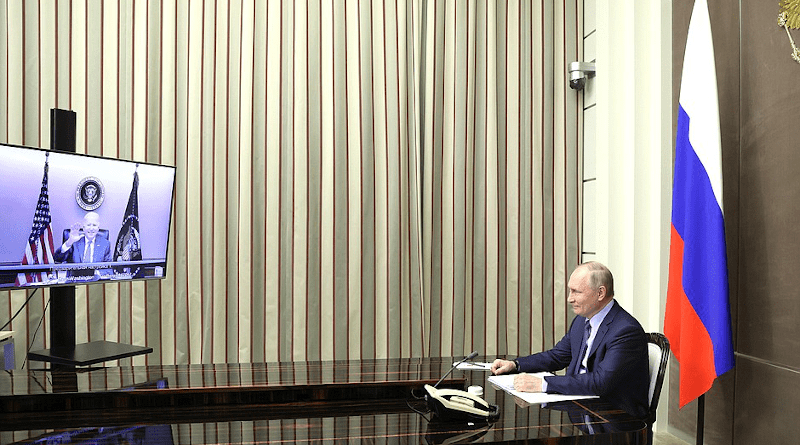Ukraine In Play After Biden-Putin Discussion – Analysis
By Vladimir Socor*
Presidents Joseph Biden of the United States and Vladimir Putin of Russia have agreed, in their December 7 video-dialogue (see EDM, December 8), to create working groups that would address Russia’s concerns regarding Ukraine’s place in the European security order. Those concerns directly relate to Ukraine’s choice of a Western orientation and its relationship with the North Atlantic Treaty Organization (NATO) and the United States.
Interviewed just ahead of the presidents’ encounter, Kremlin-connected analyst Fyodor Lukyanov had said that the dialogue would be deemed successful if Biden acknowledged Russia’s concerns and agreed to discuss them in appropriate working groups (TASS, December 7).
Biden seemingly acknowledged and agreed: “We look forward to having further meetings to discuss Russian concerns writ large with NATO, to make accommodations, to bring the temperature on the Eastern front down,” he explained the next day (YouTube, December 8).
Putin modestly credited Biden with this proposal: “I must say that it was the US president who formulated this idea, and I agreed with it” (Kremlin.ru, December 8). Attributing it to Biden lends it authority in Washington; or it at least helps defuse the mistrust that proposals carrying Putin’s byline would naturally encounter. However, Lukyanov’s preview of this event (see above) indicates that the proposal originated in the Kremlin.
Moscow looks eager to jump-start the process. It will present its proposals to the US side within a week, Putin announced the day after his conversation with Biden (Kremlin.ru, December 8).
According to Putin’s own summary the day after, he told Biden that “Russia needs reliable, legally binding guarantees that would rule out any further enlargement of NATO, as well as deployments of offensive weapons systems in countries that border on Russia” (TASS, Kremlin.ru, December 8). This is the tip of the policy iceberg—a newly developed policy of unprecedented ambition.
The Kremlin had until now framed the problem as if Ukraine’s putative NATO membership were the main point at stake. This framing has become outdated. Most member countries are obstinately keeping Ukraine out of NATO; and even the US under the Biden administration has withdrawn political support for Ukrainian NATO membership or even a Membership Action Plan (though, the US still supports Ukraine’s right to aspire to join NATO).
Moscow, however, is using the issue of Ukraine’s NATO aspirations as a hook with which to pull additional and even larger issues into the argument. These would include: Ukraine’s military and security relationships with the US and other countries on a bilateral basis, outside NATO’s framework; the foreign and security policies of Russia’s other non-NATO neighbors, in addition to Ukraine; and constraints on force levels in NATO member countries bordering on Russia, e.g. precluding the further placement of missile systems that can strike Russia. A series of Putin’s recent statements evince these objectives (Kremlin.ru, November 1, 18, 30, December 8; Globalaffairs.ru, November 24). The Kremlin is now aiming to have its say in these matters.
Biden has recognized that the Kremlin is reaching beyond Ukraine. His statement (see above) indicates a consent to discuss “NATO writ large,” with a view to “accommodating” Russia’s concerns on that level. His statement also indicates an intention to bring the United Kingdom, France, Germany and Italy (members of the Quint grouping alongside the US) to the table of negotiations with Russia. Leaders of the Quint countries have participated in several telephone conferences related to Ukraine of late; most recently in connection with the Biden-Putin dialogue. Poland and Romania, as NATO members and Ukraine’s neighbors with vital interests at stake, are not mentioned as deserving seats at this table.
Russia considers Ukraine’s foreign and security policies to be inseparably connected with Ukraine’s internal state organization. Moscow wants an internally fractured Ukraine with centrifugal forces blocking any coherent decision-making on national security and defense or indeed any coherent government. This is why Russia insists on “returning” the Russian-controlled Donbas to Ukraine with a “special status,” in practice a Russian state within the Ukrainian state and a permanent source of constitutional disputes. The Russia-dictated Minsk “agreement” forms the basis for such an arrangement in Ukraine. If applied, it would permanently consign Ukraine to a gray-zone status.
The Biden administration has apparently agreed with the Kremlin to implement this solution. Secretary of State Antony Blinken, Undersecretary Victoria Nuland, and National Security Advisor Jake Sullivan have all come out publicly in support of the Minsk “agreement” in close correlation with the Biden-Putin encounter.
Ukraine was left out of the White House’s preparations for the Biden-Putin discussion. It cannot be said that Biden presented a position pre-coordinated with Ukraine to Putin. The White House had also ignored Ukraine when greenlighting the Russian-owned Nord Stream Two pipeline, depriving Ukraine of massive transit revenue. Biden informed President Volodymyr Zelenskyy today (December 9) about the Biden-Putin talks, post factum (Twitter.com/ZelenskyyUa, One Plus One TV, December 9).
*About the author: Vladimir Socor is a Senior Fellow of the Washington-based Jamestown Foundation and its flagship publication, Eurasia Daily Monitor (1995 to date), where he writes analytical articles on a daily basis. An internationally recognized expert on the former Soviet-ruled countries in Eastern Europe, the South Caucasus, and Central Asia, he covers Russian and Western policies, focusing on energy, regional security issues, Russian foreign affairs, secessionist conflicts, and NATO policies and programs.
Source: This article was published at The Jamestown Foundation’s Eurasia Daily Monitor Volume: 18 Issue: 184

